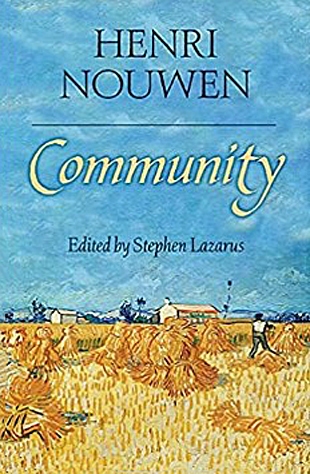These gathered writings by Henri Nouwen — a Catholic priest, professor, author and theologian featured in our Remembering Spiritual Master Project — do not put forward a spirituality of self-improvement. In order to experience the benefits that Nouwen describes, you have to create closer connections with the people around you, and together you’ll be better people. In many respects, this is more difficult and counter-cultural than simply working on ourselves alone.
The book begins with a foreword of personal reflections by Robert Ellsberg, Nouwen’s editor at both the Catholic Worker newspaper and Orbis Books, about his relationship with Nouwen and the origins of these writings. It's followed by an introduction from Stephen Lazarus, the director for research and special projects at the Henri Nouwen Society in Toronto, who offers a helpful overview of Nouwen as a writer, teacher, and retreat leader.
Lazarus explains how community was complicated for Nouwen: “For Henri, community is a basic need and hunger of the human heart. We are created for community, but often we do not experience it in the individualistic and competitive cultures that shape our lives.” And, “Community for Henri was also a difficult and lifelong quest.”
As readers of Nouwen may already know, he experienced community movingly and profoundly in places such as the Abbey of the Genesee, a Trappist monastery in upstate New York, and later in life as a member of Daybreak, an intentional Christian community in Ontario. He wrote about these experiences and challenges in some of his earlier books. Nouwen wrote honestly and vulnerably about his need for the community he discovered and relished in these places. In contrast, he did not experience community while teaching at Notre Dame, Yale, and Harvard.
Chapter 1 is a transcribed talk Nouwen gave in 1993 that looks back on several decades of a Christian life, identifying solitude and community as essential for him and for others. He felt called to both, and the one leads to the other. He writes, “It’s remarkable that solitude always calls us to community. In solitude you realize you’re part of a human family and that you want to live something together.”
In another chapter, Nouwen says: “We can start forming community, because community means solitude greeting solitude. My solitude, in which I have discovered how much I am loved, greets your solitude in which you have discovered how much you are loved.” (See the excerpt accompanying this review.)
Chapter 9 comes from a talk Nouwen gave at the University of Notre Dame in 1992 on “A Spirituality of Community.” He speaks of the importance of “sameness” over “difference” in how we approach the world and our community: “I am like other people and that is worth celebrating. That is what makes life wonderful.” He wrote these words after he had left twenty years of teaching in great universities to live with others who are severely handicapped at the L'Arche Daybreak Community in Ontario.
